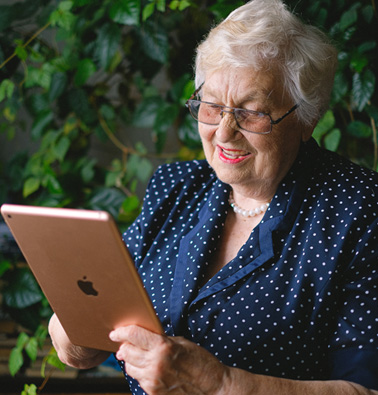How MediTelecare™ Transforms Depression Care
How MediTelecare™ Transforms Depression Care
There are certain segments of healthcare that have long been stigmatized. Behavioral health for aging adults is one of them. Progress has been made over the last several years around mental health and the heightened need to address it because of the pandemic. As a consequence of being isolated in their skilled nursing and assisted living facilities like never before, depression became more prevalent.
The stigma still exists for the older population dealing with depression and psychotherapy treatment. During this isolation period, the industry quickly realized telehealth was the disruptive force that allowed caregivers to reach these older adults effectively and implementing the right technology was not just a temporary fix but a solution to a greater issue.
The ‘barriers to access’ that telehealth overcomes
Access barriers to depression treatment are high for older age groups, due in part to their limited mobility and short supply of mental health providers who specialize in depression care for senior adults, especially in rural areas.
It doesn’t matter if it’s times of adjustment or clinical depression, staffing shortages, prolonged wait times, quarantine regulations, and transportation issues all inhibit the ability to properly treat patients. The pandemic escalated the need for federal approval of telehealth appointments, but it also revealed an even greater need for the aging population—greater access to care. More mediums needed to become available for seniors to address their depression, and telehealth was a workable solution.
For those struggling with depression and experiencing apathy or amotivation, the benefits of treating depression via telehealth at senior living facilities are vast, opening a door to less stress and more convenience.
Many people who are depressed usually travel more than 10 miles to see a health care provider. Those with mobility challenges worry about packing up to leave the facility and wonder if the doctor’s office is accessible to their physical limitations. Offering behavioral health services through an intuitive platform from a remote location leads to better patient outcomes because they have the option to stay in an environment that’s conducive to their needs.
Patients also feel more at ease because a telehealth session can be done in a familiar setting within their facility. It eliminates the hassles of securing transportation and traveling to a doctor’s office because appointments are made digitally and facilitated remotely, adding an extra layer of privacy for the patient. They also feel more comfortable seeing the doctor online because they are surrounded by their belongings and in their own space, which may help them dive deeper into the challenges they are facing and lead to workable solutions sooner.
How MediTelecare™ is changing the way depression care is delivered
The future of telehealth use for mental health care is bright. Functional access to depression care is the cultural shift needed in the senior care industry and telehealth availability, like MediTelecare’s, is leading the way.
We are the industry leader in providing behavioral and mental telehealth services to residents of skilled nursing and assisted living facilities. Our services utilize Televideo with face to face communication, and other virtual telemedicine technologies to streamline diagnostic evaluations, and design personalized treatment plans for each resident’s needs.
Treating depression in senior living facilities should be comprehensive, not a one-method approach. While patients often are prescribed medications, like Benzodiazepines, to combat symptoms, many people with depression also benefit from non-pharmacological interventions and medication reduction as the first line of treatment when possible.
Our multidisciplinary teams administer thorough psychological and cognitive evaluations that make behavioral health care easier and help to avoid costly rehospitalizations. MediTelecare does a comprehensive review on medication therapies and complementary therapies that help to achieve the best, and safest possible patient outcomes.
We’ve developed an ambulatory browser-based and care-coordinated app called MediTely, helping to transition patients from facility to home with no disruption to care. Users can reach out to a network of licensed clinicians who offer a wide variety of treatments, including assessments, counseling services, and medication management services. The real-time televideo is augmented by a care coordinator who guides senior patients through the whole process through either an online chat or voice call.
Benefits of MediTelecare’s™ telehealth care:
- Minimized use of psychotropic medications ensuring safety and well-being
- On-site access to care resulting in no interruptions in daily care
- Improved quality of life through proper medication management and non-pharmacological interventions
- Scheduled visits individualized to the resident, improving continuity of care
Personalized depression care that works
The older population has only ever been used to face-to-face provider interaction in their lifetime, so it’s important to offer a personalized approach that is similar to that experience that they remember. It’s also important to address their depression care with compassion and from a holistic approach. MediTelecare™ works with patients to promote healthy aging so they can feel like themselves again. That is always a stigma worth changing.
To see how senior care facilities can offer more effective clinical outcomes to depression care and help to streamline diagnostic evaluations and design custom treatment plans personalized to each patient, contact us or request a demo today!




